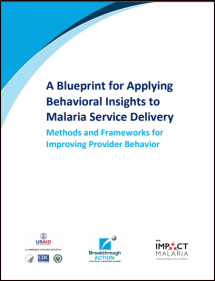A Blueprint for Applying Behavioral Insights to Malaria Service Delivery: Methods and Frameworks for Improving Provider Behavior
Making strides in malaria control require a strong focus on provider behavior. As key influencers in the client-provider interaction, providers serve as gatekeepers for the uptake of IPTp, malaria testing, and adherence to test results.
Providers’ interpersonal skills and the quality of counseling may affect client comprehension of medication regimens, completion of referrals, and future care-seeking. As the ones responsible for filling in registers and for submitting stock and Health Management Information Systems (HMIS) forms, providers also control the timeliness, completeness, and accuracy of service statistics. Improving providers’ case management, malaria in pregnancy, and reporting behaviors will be crucial for reducing morbidity and mortality, improving surveillance, and measuring gaps and progress in malaria service delivery.
The blueprint outlines a systematic method for understanding and addressing provider malaria behavior. Evidence about the drivers of provider behavior and what works to improve it was also shared. Best practices for designing provider behavior change activities and how they can be practically applied within the malaria service delivery context were discussed and illustrated with examples from the field. Applying these practices may help countries approach provider behavior more strategically and improve and innovate on their work.
- Webinar Recap, Video, Resources
- Plan directeur pour l’application des connaissances comportementales à la prestation des services de lutte contre le paludisme Méthodes et cadres pour l’amélioration du comportement des prestataires
- A Blueprint for Applying Behavioral Insights to Malaria Service Delivery Methods and Frameworks for Improving Provider Behavior
Last modified: December 21, 2020
Language: English

